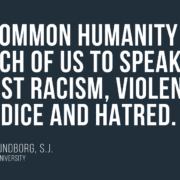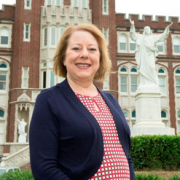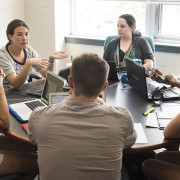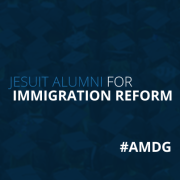“Put Your Money Where Your Mouth Is”
BY ISN STAFF | November 13, 2012
The following entitled is an interview with Josh Daly, Interim Director for the Center for Community Engagement at Loyola University New Orleans about socially responsible investing in Jesuit universities.
Written by: Shannon Doyle, ISN Intern
 Q:What does socially responsible investing mean to you?
Q:What does socially responsible investing mean to you?
A: Socially responsible investing (SRI) is about making our financial investments align with our values which revolve around social benefits and are good for people, communities, and the environment, good for the planet and are about building long term wealth for communities. So sometimes it’s divided up into triple bottom line or integrated bottom line, social, environmental, and people. So in other words people, planet, and profit.
Q: Why do you believe socially responsible investing is important to the mission of Jesuit institutions?
A: It’s about putting our money where our mouths are, where are hearts are. I believe we do a lot of things to promote the values we share as Jesuit universities, around solidarity, care and concern for the marginalized, the environment and all creation as well as being men and women with and for others. We talk a lot about that and do a lot of work that way through service and reflection and a variety of academic and extra academic ways, but we don’t always think about it in terms of our business operations as a university, we don’t think about it as a way to live out our values. It aligns very deeply with the values we profess as Jesuit Universities and it’s really a challenge to live those out in everything that we do.
Q: What is an important first step a University could make to becoming a socially responsible investor?
A: The first step is a conversation among students, faculty, staff, and administrators to learn about this, to learn what institutions are doing in terms of shareholder advocacy and engagement and community investment as well as screening and different methods to align our mission with our investments. So the first steps are education and having a conversation and then I think beginning to lay the groundwork for institutions to have things in place that kind of support that. So a mid term or long term goal is to have a policy and a committee that can support this and advise on socially responsible investing opportunities and practices. So the first thing is really starting and raising a conversation about it.
Q: How can socially responsible responsible investing impact a community?
A: If you’re talking about community investments, which are community development financial institutions that have social missions as part of what they do, so community development credit unions, and focus on local economic development in areas where conventional banks aren’t lending as much, it can have a huge impact. For instance in New Orleans there is a community development loan fund which invests money in affordable housing development. It gives a modest return on investment but it also allows for affordable housing development in New Orleans and in our neighborhoods. On the shareholder advocacy and engagement type of things the Jesuit Social Research Institute (JSRI) are educating a number of people who are lobbying the private prison industry to adopt human rights policy on how they manage their prisons. It’s real change and it’s large change. These are big corporations whose policies around human rights and the environment can have huge negative or positive effects on peoples lives. So it’s real social justice change at a systems level.
Q: What would you say to individuals who say you can’t get the same returns with socially responsible companies as with others?
A: Its usually the knee jerk reaction that you get and it is why we are moving away from the language of SRI because it’s usually associated with screening, so saying you will or won’t invest in particular types of companies based on how they align with your values. If you’re in traditional investing you want to mitigate your risk by spreading out the money, don’t put all your eggs in one basket. So I think I respond by saying that there are ways that that can still be done, that positive and negative screening can be done in ways that don’t minimize your returns, that you can get consistent and good returns, and there are studies that have shown this over the years. In particular there is a study done by the United Nations (UN) about SRI and how it affects returns.
The other thing is that the most interesting developments in socially responsible investing in the last couple decades have been in community investment and shareholder engagement. In community investment there have been all the same type of investment instruments so you can invest with the same levels of risks and same potential for returns at a community level as you could with larger banks. So it could be a matter of simply moving your money as an institution from a large bank to a community development bank or credit union, which has all the same federal insurance and backing and so is not riskier. You are going to get the same sort of returns and the same sort of portfolio options with community investment. And shareholder engagement doesn’t necessarily involve moving a big portion of your money in general. You only have to keep an advocacy portfolio. So you can keep a small amount that allows you to vote on issues the company brings up to its shareholders on governance issues and policy, environmental, and social issues. So that is a small fractions of what our endowments actually look like, they are usually one hundred million plus dollars and for these social advocacy portfolios that we would have, and it is only a fraction, maybe two thousand shares that allow you to engage them through meeting with their board, through letters, through a variety of different means. It is not risky behavior and you can do it in such a way as to get consistent and good returns equal to the market over the years and that are consistent with your overall investment strategy.
Q: How can students become involved and make an impact in how their University invests its funds?
A: It can be different on different campuses. I mentioned the first step is education, I think it needs some concrete action too, so it may be a matter of educating the community through say, demonstrations or through letters or articles in the school newspaper or whatever it might be. A campaign to raise the question and get some real response from their school, the faculty, staff, administrators, and student body. So I think it’s education at one level and it’s finding where your passion is in this. I think it can sound really obscure and it’s not the language we are used to using when it comes to social justice, to talk about investing and endowments but when you’re talking about social and human rights and the effect companies have on these issues it’s huge. So finding your passion and how it connects to these issues, such as the Occupy Wall Street movement, the Move Our Money campaign are items that resonate with students and organizing around that. There are organizations, like the Responsible Endowments Coalition who have many tools to support students who want to do this and there are students on Jesuit campuses who are doing this work. At Loyola University Chicago, at University of San Francisco, at Fairfield University, even down here at Loyola University New Orleans. So there are ways to find out and get excited about this.
Q:Is there anything else you believe individuals should know when it comes to socially responsible investing?
A: Well I think from what I’ve seen, especially for students the biggest barrier is it feels like it’s this specialist theoretical language, and they get intimidated by that and they try to understand all the in and outs of endowment etc, etc. I don’t think you have to get yourself so immersed in that that you have to lose the passion. So whatever it is that is your passion, if its around human rights issues and water issues, water access in developing countries, or if your passion is around human rights in prisons, or it is about community development in your own community or about equitable development for marginalized groups in the local community. Whatever it is stick with that passion and find out the ways this can be a tool to help you achieve and leverage some real change for social justice. The big thing I want to say to students is this is a set of tools that basically are very powerful for achieving the kinds of things student want to achieve, the change they want to see.










Leave a Reply
Want to join the discussion?Feel free to contribute!